Intro
Discover the vital role of Aldosterone Hormone Function in regulating blood pressure, electrolyte balance, and fluid homeostasis, with impacts on cardiovascular health, kidney function, and adrenal gland disorders.
The human body is a complex system that relies on various hormones to function properly. One of these essential hormones is aldosterone, which plays a crucial role in maintaining the balance of fluids and electrolytes in the body. Aldosterone is a steroid hormone produced by the adrenal glands, and its functions are vital for overall health. In this article, we will delve into the importance of aldosterone, its functions, and how it affects the body.
Aldosterone is often referred to as the "mineralocorticoid" hormone because of its role in regulating the balance of minerals such as sodium and potassium in the body. This hormone helps to control the amount of fluid in the bloodstream, which in turn affects blood pressure. The balance of fluids and electrolytes is essential for maintaining proper blood pressure, and aldosterone plays a critical role in this process. Without aldosterone, the body would be unable to regulate the balance of fluids and electrolytes, leading to a range of health problems.
The importance of aldosterone cannot be overstated, and its functions are vital for maintaining overall health. Aldosterone helps to regulate the amount of sodium and potassium in the body, which is essential for maintaining proper blood pressure. It also helps to regulate the amount of fluid in the bloodstream, which is critical for maintaining proper blood volume. In addition, aldosterone helps to regulate the balance of other essential minerals such as calcium and magnesium. The hormone's functions are so critical that any imbalance can lead to a range of health problems, including high blood pressure, heart disease, and kidney disease.
Aldosterone Hormone Function and Regulation
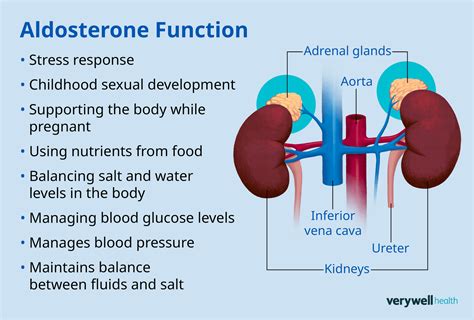
Aldosterone is produced by the adrenal glands, which are located on top of the kidneys. The production of aldosterone is regulated by the renin-angiotensin-aldosterone system (RAAS), which is a complex system that helps to regulate blood pressure. The RAAS system is triggered by a decrease in blood volume or blood pressure, which stimulates the release of renin, an enzyme that helps to produce aldosterone. Once aldosterone is produced, it helps to regulate the balance of fluids and electrolytes in the body by stimulating the kidneys to retain sodium and water.
The regulation of aldosterone is critical for maintaining proper blood pressure and fluid balance. The hormone's functions are regulated by a range of factors, including the RAAS system, the sympathetic nervous system, and the levels of sodium and potassium in the body. Any imbalance in these factors can lead to an imbalance in aldosterone production, which can have serious health consequences. For example, an overproduction of aldosterone can lead to high blood pressure, while an underproduction can lead to low blood pressure.
Benefits of Aldosterone
The benefits of aldosterone are numerous, and its functions are essential for maintaining overall health. Some of the benefits of aldosterone include: * Regulating the balance of fluids and electrolytes in the body * Maintaining proper blood pressure * Regulating the amount of sodium and potassium in the body * Helping to regulate the balance of other essential minerals such as calcium and magnesium * Playing a critical role in the regulation of blood volumeThe benefits of aldosterone are clear, and its functions are vital for maintaining proper health. Without aldosterone, the body would be unable to regulate the balance of fluids and electrolytes, leading to a range of health problems. The hormone's functions are so critical that any imbalance can lead to serious health consequences, including high blood pressure, heart disease, and kidney disease.
Aldosterone and Blood Pressure Regulation
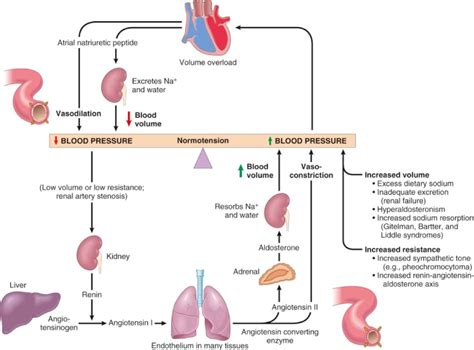
Aldosterone plays a critical role in the regulation of blood pressure. The hormone helps to regulate the amount of fluid in the bloodstream, which in turn affects blood pressure. When aldosterone levels are high, the kidneys retain more sodium and water, which increases blood volume and blood pressure. Conversely, when aldosterone levels are low, the kidneys excrete more sodium and water, which decreases blood volume and blood pressure.
The regulation of blood pressure is critical for maintaining proper health. High blood pressure can lead to a range of health problems, including heart disease, kidney disease, and stroke. Low blood pressure can also lead to health problems, including dizziness, fainting, and organ failure. The balance of aldosterone is critical for maintaining proper blood pressure, and any imbalance can lead to serious health consequences.
Factors that Affect Aldosterone Production
A range of factors can affect aldosterone production, including: * The RAAS system * The sympathetic nervous system * The levels of sodium and potassium in the body * The levels of other essential minerals such as calcium and magnesium * Certain medications, such as diuretics and beta blockersThese factors can affect aldosterone production, leading to an imbalance in the hormone's functions. For example, a decrease in blood volume or blood pressure can stimulate the production of aldosterone, while an increase in sodium levels can decrease aldosterone production. Understanding the factors that affect aldosterone production is critical for maintaining proper health and preventing a range of health problems.
Aldosterone Imbalance and Health Problems
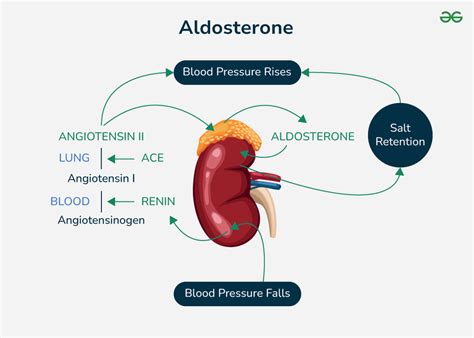
An imbalance in aldosterone production can lead to a range of health problems. An overproduction of aldosterone can lead to high blood pressure, while an underproduction can lead to low blood pressure. An imbalance in aldosterone can also lead to other health problems, including:
- Kidney disease
- Heart disease
- Stroke
- Dizziness and fainting
- Organ failure
The health problems associated with an aldosterone imbalance are serious and can have a significant impact on quality of life. Understanding the causes of an aldosterone imbalance is critical for preventing and treating these health problems. A range of factors can contribute to an aldosterone imbalance, including genetic disorders, certain medications, and underlying medical conditions.
Treatment Options for Aldosterone Imbalance
Treatment options for an aldosterone imbalance depend on the underlying cause of the imbalance. Some treatment options include: * Medications, such as diuretics and beta blockers * Lifestyle changes, such as reducing sodium intake and increasing potassium intake * Surgery, in some casesTreatment options should be tailored to the individual's specific needs and health status. In some cases, medication may be necessary to regulate aldosterone production and prevent health problems. In other cases, lifestyle changes may be sufficient to restore balance to the hormone's functions.
Aldosterone and Kidney Function
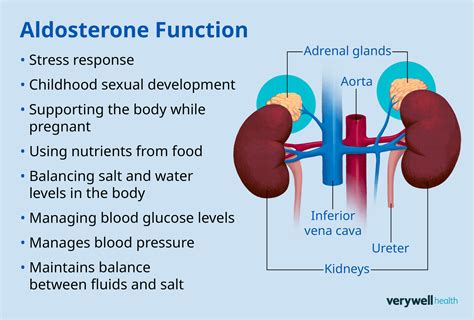
Aldosterone plays a critical role in kidney function. The hormone helps to regulate the amount of sodium and water in the body, which is essential for maintaining proper blood volume and blood pressure. The kidneys play a critical role in regulating aldosterone production, and any imbalance in the hormone's functions can lead to kidney disease.
Kidney disease is a serious health problem that can have a significant impact on quality of life. Understanding the relationship between aldosterone and kidney function is critical for preventing and treating kidney disease. A range of factors can contribute to kidney disease, including an aldosterone imbalance, diabetes, and high blood pressure.
Importance of Aldosterone in Maintaining Proper Health
The importance of aldosterone in maintaining proper health cannot be overstated. The hormone's functions are vital for regulating the balance of fluids and electrolytes in the body, maintaining proper blood pressure, and preventing a range of health problems. An imbalance in aldosterone production can lead to serious health consequences, including high blood pressure, kidney disease, and heart disease.Understanding the importance of aldosterone is critical for maintaining proper health. A range of factors can affect aldosterone production, including the RAAS system, the sympathetic nervous system, and the levels of sodium and potassium in the body. By understanding these factors and taking steps to maintain proper health, individuals can reduce their risk of developing health problems associated with an aldosterone imbalance.
Aldosterone and Blood Volume Regulation
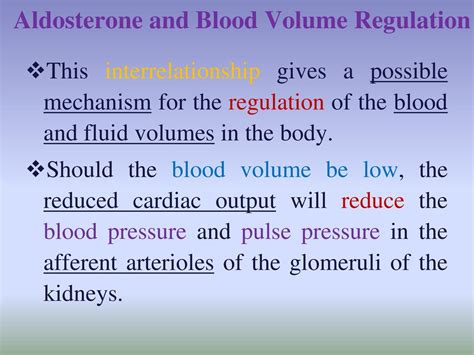
Aldosterone plays a critical role in regulating blood volume. The hormone helps to regulate the amount of sodium and water in the body, which is essential for maintaining proper blood volume and blood pressure. When aldosterone levels are high, the kidneys retain more sodium and water, which increases blood volume and blood pressure. Conversely, when aldosterone levels are low, the kidneys excrete more sodium and water, which decreases blood volume and blood pressure.
The regulation of blood volume is critical for maintaining proper health. An imbalance in blood volume can lead to a range of health problems, including high blood pressure, low blood pressure, and kidney disease. Understanding the relationship between aldosterone and blood volume regulation is critical for preventing and treating these health problems.
Factors that Affect Blood Volume Regulation
A range of factors can affect blood volume regulation, including: * The RAAS system * The sympathetic nervous system * The levels of sodium and potassium in the body * The levels of other essential minerals such as calcium and magnesium * Certain medications, such as diuretics and beta blockersThese factors can affect blood volume regulation, leading to an imbalance in the body's fluids and electrolytes. Understanding these factors is critical for maintaining proper health and preventing a range of health problems.
Aldosterone and Electrolyte Balance
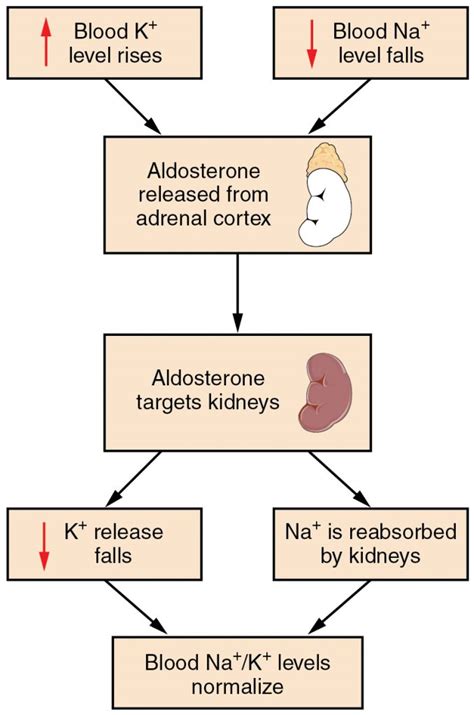
Aldosterone plays a critical role in maintaining electrolyte balance. The hormone helps to regulate the amount of sodium and potassium in the body, which is essential for maintaining proper muscle and nerve function. An imbalance in electrolytes can lead to a range of health problems, including muscle weakness, fatigue, and heart arrhythmias.
The importance of electrolyte balance cannot be overstated. Electrolytes are essential for maintaining proper muscle and nerve function, and an imbalance can have serious health consequences. Understanding the relationship between aldosterone and electrolyte balance is critical for preventing and treating a range of health problems.
Importance of Maintaining Proper Electrolyte Balance
Maintaining proper electrolyte balance is critical for overall health. Electrolytes are essential for maintaining proper muscle and nerve function, and an imbalance can lead to a range of health problems. A range of factors can affect electrolyte balance, including: * The RAAS system * The sympathetic nervous system * The levels of sodium and potassium in the body * The levels of other essential minerals such as calcium and magnesium * Certain medications, such as diuretics and beta blockersUnderstanding these factors is critical for maintaining proper electrolyte balance and preventing a range of health problems. By taking steps to maintain proper electrolyte balance, individuals can reduce their risk of developing health problems associated with an electrolyte imbalance.
What is aldosterone and what does it do?
+Aldosterone is a steroid hormone produced by the adrenal glands that helps to regulate the balance of fluids and electrolytes in the body. It plays a critical role in maintaining proper blood pressure, regulating the amount of sodium and potassium in the body, and preventing a range of health problems.
What are the benefits of aldosterone?
+The benefits of aldosterone include regulating the balance of fluids and electrolytes in the body, maintaining proper blood pressure, regulating the amount of sodium and potassium in the body, and preventing a range of health problems.
What happens if aldosterone levels are too high or too low?
+If aldosterone levels are too high, it can lead to high blood pressure, kidney disease, and heart disease. If aldosterone levels are too low, it can lead to low blood pressure, dizziness, and fainting.
In conclusion, the importance of aldosterone in maintaining proper health cannot be overstated. The hormone's functions are vital for regulating the balance of fluids and electrolytes in the body, maintaining proper blood pressure, and preventing a range of health problems. By understanding the importance of aldosterone and taking steps to maintain proper health, individuals can reduce their risk of developing health problems associated with an aldosterone imbalance. If you have any questions or concerns about aldosterone or would like to learn more about how to maintain proper health, please do not hesitate to reach out. Share this article with others to help spread awareness about the importance of aldosterone and its role in maintaining proper health.
